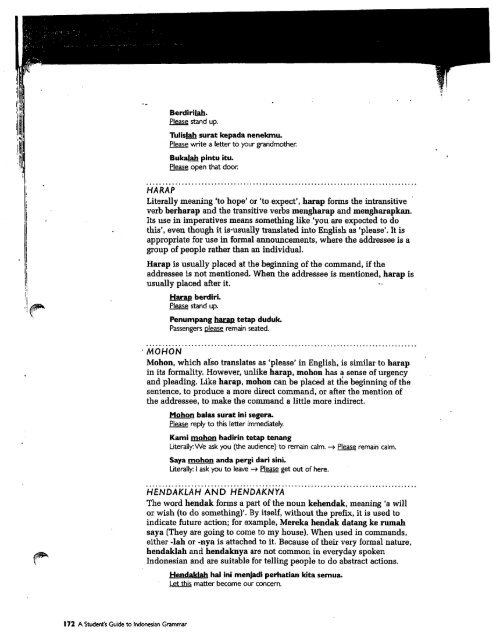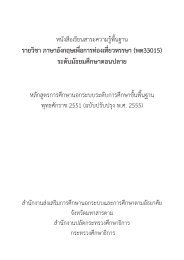bahasa indonesia
djenar-2003-a-students-guide-to-indonesian-grammar-oxford
djenar-2003-a-students-guide-to-indonesian-grammar-oxford
- No tags were found...
Create successful ePaper yourself
Turn your PDF publications into a flip-book with our unique Google optimized e-Paper software.
- L<br />
Berdirim.<br />
Please stand up.<br />
Tulism surat kepada nenekmu.<br />
Please write a letter to your grandmother:<br />
Bukau pintu itu.<br />
Please open that door.<br />
...................................................................................<br />
HARAP<br />
Literally meaning 'to hope' or 'to expect', harap forins the intransitive<br />
verb berharap and the transitive verbs mengharap and mengbarapkan.<br />
Its use in imperatives means something like .'you are expected to do<br />
this', even though it is-usually translated into English as 'please'. It is<br />
appropriate for use in formal announcements, where the addressee is a<br />
group of people rather than an individual.<br />
Harap is usually placed at the beginning of the command, if the<br />
addressee is not mentioned. When the addressee is mentioned, harap is<br />
usually placed after it. - -<br />
Harap berdiri.<br />
Please stand up.<br />
Penumpang harap tetap duduk<br />
Passengers please remain seated.<br />
....................................................................................<br />
MOHON<br />
Mohon, which also translates as 'please' in English, is similar to harap<br />
in its formality. However, unlike harap, mohon has 9 sense of urgency<br />
and pleading. Like harap, mohon can be placed at the beginning of the<br />
sentence, to produce a more direct command, or after the mention of<br />
the addressee, to make the command a little more indirect,<br />
Mohan balas surat ini segera<br />
Please reply to this letter immediately<br />
Kami rnahon hadirin tetap tenang<br />
Literally We ask you (the audience) to remain calm. + Please remain calm.<br />
Saya mohon anda pergi dari sini.<br />
Literally: I ask you to leave + Please get out of here.<br />
....................................................................................<br />
HENDAKLAH AND HENDAKNYA<br />
The word hendak forms a part of the noun kehendak, meaning 'a will<br />
or wish (to do something)'. By itself, without the prefix, it is used to<br />
indicate future action; for example, Mereka hendak datang ke rumah<br />
saya (They are going to come to my house). When used in commands,<br />
either -1ah or -nya is attached to it. Because of their very formal nature,<br />
hendak3ah and hendaknya are not common in everyday spoken<br />
Indonesian and are suitable for telling people to do abstract actions.<br />
Hendaklah ha1 ini menjadi perhatian kita semua.<br />
Let this matter become our concern.<br />
172 A Student's Guide to hdonesian Grammar



